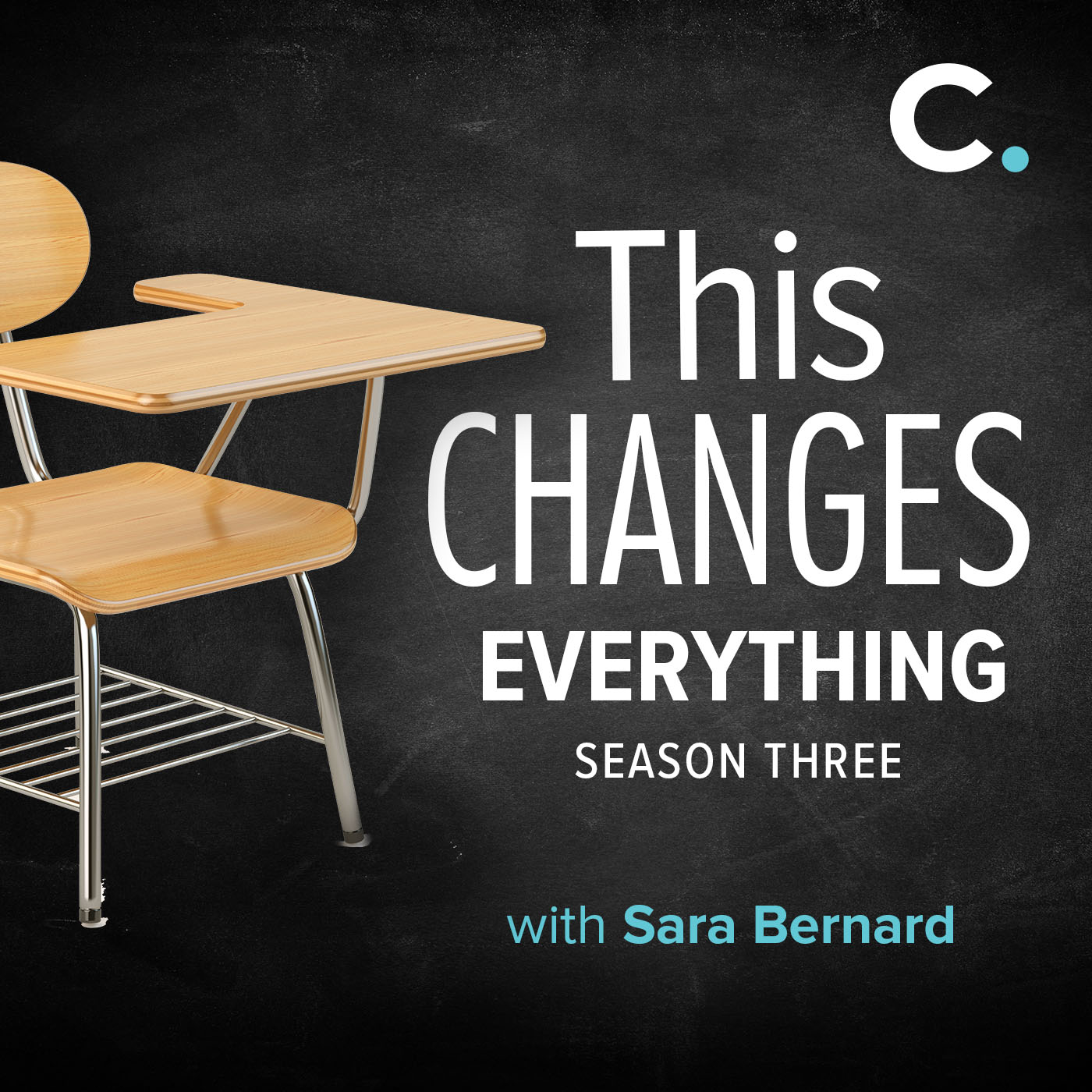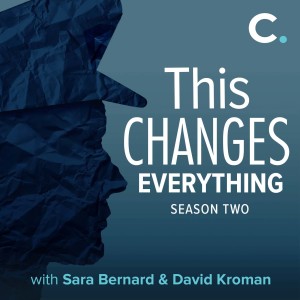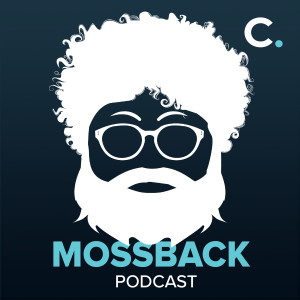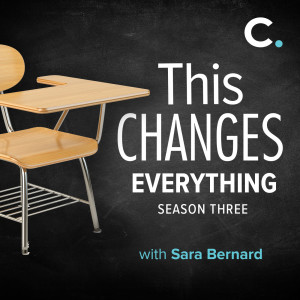
An exploration of the transformational events and movements that are creating a new normal in our society, as told by reporters on the ground in the Pacific Northwest. Hosted by Sara Bernard. Season 1: The Pandemic Season 2: Defunding the Police Season 3: Education … Cover photo by Lindsey Wasson
Episodes

Thursday Jan 28, 2021
Ep. 1 - How Reform Gave Way to ‘Defund the Police’ in Seattle (Season 2)
Thursday Jan 28, 2021
Thursday Jan 28, 2021
The city spent a decade working to reform its police department. Then, the turmoil of 2020 started a new movement.
In the midst of the anti-racism protests that followed the killing of George Floyd by Minneapolis police last spring, a new cry went out: "Defund the police!" And in the weeks that followed, Seattle city leaders appeared to be listening.
Members of the Seattle City Council, responding to strong advocacy from inside and outside government, pledged to cut the police force by 50%. Cuts did come, but in the end they were less than revolutionary and the debate became muddled and complex.
For the second season of This Changes Everything, host Sara Bernard and reporter David Kroman are seeking to bring clarity to that debate. Over the course of six episodes, the podcast will take a close look at challenges of policing today and whether it’s even possible to downsize the police force and create a new public safety regime that is more equitable and safe.
This first episode starts by looking back, about a decade, to Seattle’s previous efforts toward reform and examines how the events in June led many city leaders to decide the earlier reform efforts were the wrong solution.
---
Credits
Host, producer: Sara Bernard
Reporter: David Kroman
Story editor: Donna Gordon Blankinship
Executive producer: Mark Baumgarten
Full transcript available here.

Thursday Jan 28, 2021
Ep. 2 - Cops, Crisis Calls and Conflict Over Who Should Help (Season 2)
Thursday Jan 28, 2021
Thursday Jan 28, 2021
The debate over public safety is filled with disagreements, but almost everyone agrees on one thing: We need another option for people in crisis.
In this episode of This Changes Everything’s focus on defunding the police, reporter David Kroman rides along with Sandlin Grayson, a member of the Seattle Police Department Crisis Response Team, to observe how the police approach crisis calls.
Kroman then speaks to the team at the Downtown Emergency Service Center, one of Seattle’s largest nonprofits serving the homeless. Although they have some appreciation for cops like Grayson, they argue that there must be a better way to help people in crisis.
This six-part podcast, produced by Sara Bernard, takes a close look at challenges of policing today and whether it’s even possible to downsize the police force and create a new public safety regime that is more equitable and safe.
---
Credits
Host, producer: Sara Bernard
Reporter: David Kroman
Story editor: Donna Gordon Blankinship
Executive producer: Mark Baumgarten
Full transcript available here.

Thursday Jan 28, 2021
Ep. 3 - Who’s to Blame When Crisis Calls Go Wrong (Season 2)
Thursday Jan 28, 2021
Thursday Jan 28, 2021
Seattle police have undergone additional training to better respond to people in crisis, but still things go wrong and people die. Why?
Seattle police, more than many police departments, have extensive training to improve their response to people in crisis — but people are still dying. In this episode of This Changes Everything’s focus on defunding the police, we look at what happens when things go wrong.
Reporter David Kroman revisits the case of Charleena Lyles, a young Black mother who was killed by Seattle police in one of the department's most controversial incidents. There is little doubt that Lyles' death was the result of a failure, but there is disagreement over where the blame for that failure lies.
To understand what happened and what it can tell us about the complicated role of police in crisis calls, Kroman explores the choices made by officers on the day of Lyles' death, as well as those made within the system before the encounter.
This six-part podcast, produced by Sara Bernard and reported by David Kroman, takes a close look at challenges of policing today and whether it’s possible to downsize the police force and create a new public safety regime that is more equitable and safe.
---
Credits
Host, producer: Sara Bernard
Reporter: David Kroman
Story editor: Donna Gordon Blankinship
Executive producer: Mark Baumgarten
Full transcript available here.

Thursday Jan 28, 2021
Ep. 4 - A Ride Along With a Police Alternative (Season 2)
Thursday Jan 28, 2021
Thursday Jan 28, 2021
As cities have searched for non-police options for crisis response, many have arrived in an unlikely place: Eugene, Oregon.
In this episode of This Changes Everything’s focus on efforts to defunding the police, host Sara Bernard heads to Eugene for a virtual ride along with CAHOOTS (Crisis Assistance Helping Out on the Streets), an inventive and unique effort to respond to crisis calls with social workers instead of police.
In the calls to defund police and invest in alternatives, CAHOOTS has become the model. We get the real story about how it works and what problems it faces and consider the question: Is the program scalable from a small city like Eugene to a bigger metropolis like Seattle?
This six-part podcast, produced by Bernard and reported by David Kroman, takes a close look at challenges of policing today and whether it’s possible to downsize the police force and create a new public safety regime that is more equitable and safe.
---
Credits
Host, producer: Sara Bernard
Reporter: David Kroman
Story editor: Donna Gordon Blankinship
Executive producer: Mark Baumgarten
Read the full transcript here.

Thursday Jan 28, 2021
Ep. 5 - Defund, Then What? Activist Ideas for Police Dollars (Season 2)
Thursday Jan 28, 2021
Thursday Jan 28, 2021
Many activists leading the call to defund the police say the answer to disproportionate policing is to take money from the cops and give it to communities. But change is never as easy as writing new lines in a city budget.
In this episode of This Changes Everything’s look at efforts to defund the police, Sara Bernard and David Kroman examine emerging community programs that are seeking to take the place of police as a way to dismantle the systemic racism that has long been part of the American criminal justice system.
These Seattle programs look to keep members of the city’s Black and brown communities, in particular, out of the criminal justice system by redirecting at-risk community members with various forms of support.
This six-part podcast, produced by Bernard and reported by Kroman, takes a close look at challenges of policing today and whether it’s possible to downsize the police force and create a new public safety regime that is more equitable and safe.
---
Credits
Host, producer: Sara Bernard
Reporter: David Kroman
Story editor: Donna Gordon Blankinship
Executive producer: Mark Baumgarten
Read the full transcript here.

Thursday Jan 28, 2021
Ep. 6 - When Defunding the Police Meets Political Reality (Season 2)
Thursday Jan 28, 2021
Thursday Jan 28, 2021
More than 6 months after first pledging to rethink public safety, city leaders face opposition. What’s next?
As anti-racism protesters filled city streets this past summer with calls for a radical rethinking of public safety, a majority of Seattle City Council members responded by committing to cut the city's police budget by 50%. But making good on that promise has been difficult.
In this, the final episode of This Changes Everything’s focus on efforts to defund the police, Sara Bernard and David Kroman discuss the political pain and potential ramifications that have come since the council members committed to those cuts.
So far, the council has made cuts to the city police budget amounting to nearly 20%. Will they make those additional cuts? Will oppositional forces prevent them from doing so? What comes next? One thing about the future is known: The hard work of reforming the police force is still to come.
This six-part podcast. produced by Bernard and reported by Kroman, takes a close look at challenges of policing today and whether it’s possible to downsize the police force and create a new public safety regime that is more equitable and safe.
---
Credits
Host, producer: Sara Bernard
Reporter: David Kroman
Story editor: Donna Gordon Blankinship
Executive producer: Mark Baumgarten
Read the full transcript here.

Wednesday Jan 12, 2022
Introducing the Mossback podcast!
Wednesday Jan 12, 2022
Wednesday Jan 12, 2022
This week we have a special preview of Mossback, a companion podcast to the popular Mossback’s Northwest video series that airs on KCTS 9. The Mossback podcast digs deeper into the topics that fans want to know more about from the current season of Mossback’s Northwest.
Hosted by Sara Bernard, each episode of this series will feature an interview with Mossback, Knute Berger, about one episode of the video series. The podcasts will provide stories and factoids that were left on the cutting room floor, along with critical analysis from Berger and a greater context that will stitch each topic into the long, storied history of the Pacific Northwest.
---
Credits
Hosts: Sara Bernard, Knute Berger
Editorial assistance: Mason Bryan
Executive producer: Mark Baumgarten

Thursday Mar 10, 2022
Season 3 Coming March 23
Thursday Mar 10, 2022
Thursday Mar 10, 2022
The third season of Crosscut’s podcast on our new normal explores what the pandemic has taught us about public schools — and where we might go from here.
As we navigate the third consecutive school year impacted by COVID-19, some teachers, students and families see this tumultuous moment as more than a challenge. It’s also an opportunity. Yes, school shutdowns across Washington state and the nation forced millions of children to attend school online for the first time, resulting in all kinds of chaos, frustration, mental health struggles, academic learning loss and even a dip in public school enrollment. But there are things we’ve learned from this experience, too — including, in some cases, a fresh perspective on deep, systemic issues that have been plaguing education since long before the virus. As many schools return to physical classrooms and manage a bumpy “return to normal,” we ask: Is “normal” even possible? And is that even our goal: To return to the old approach to public education? Host Sara Bernard talks to teachers, parents, students and administrators in search of answers.
Look for new episodes wherever you listen on Wednesday, March 23.

Tuesday Mar 22, 2022
Ep. 1 - Grace (Season 3)
Tuesday Mar 22, 2022
Tuesday Mar 22, 2022
Early in the pandemic, many educators gave student well-being priority over academic performance. Some never stopped.
When schools shut down early in the COVID-19 pandemic, it was unprecedented. The vast majority of teachers had never done school outside the school building before. The vast majority of students hadn’t, either. And no one knew from day to day how long the shutdown would last. Cases were on the rise and lots of parents were losing their jobs.
It was a collective trauma that affected students and teachers alike. And because schools were in survival mode, and everyone was going through it, standard operating procedure went out the door. Standards and rules were replaced by flexibility and emotional awareness and an approach anchored in the idea of grace. Washington State Superintendent of Public Instruction Chris Reykdal took a “do no harm” approach and introduced a no-fail policy.
As schools reopened in 2021 in many places, the traditional measures of success were reintroduced. The results were troubling, with many students falling behind or even disappearing from the public education system entirely.
For this episode of This Changes Everything, host Sara Bernard speaks with a number of teachers who believe the solution to flagging student achievement is a continuation of the practices adopted early in the pandemic. If they prioritize student happiness, well-being, and a sense of belonging at school, they say, the rest will follow.
---
Credits
Host/Producer: Sara Bernard
Reporters: Venice Buhain, Claudia Rowe
Editorial assistant: Brooklyn Jamerson-Flowers
Consulting editor: Donna Blankinship
Executive producer/story editor: Mark Baumgarten
Audio support: Jonah Cohen

Tuesday Mar 22, 2022
Ep. 2 - The Kids Are Not All Right (Season 3)
Tuesday Mar 22, 2022
Tuesday Mar 22, 2022
Rates of depression, anxiety, suicidal ideation and behavioral crises have risen during the pandemic. Are schools equipped for the needs they now face?
Even before the pandemic, the mental health of young people was a growing concern. By 2018, for instance, suicide had become the second leading cause of death among people age 10 to 24. And in 2019, according to data from the Centers for Disease Control and Prevention, one in three high school students reported persistent feelings of sadness or hopelessness.
The pandemic only made things worse. According to a recent U.S. Surgeon General report, depression and anxiety symptoms have doubled among youth across the world. Emergency room visits in the U.S. for suspected suicide attempts among adolescent girls are up more than 50%. And there is a documented spike in suicides among children of color.
That mental health strain appears to be manifesting at school in a number of ways. Reports of behavioral issues and violence are rising, student achievement and attendance are flagging and the demand for professional help is overwhelming the systems set up to care for young people. Meanwhile, the adults tasked with providing support to students at school — the guidance counselors and teachers — are struggling, too.
For this episode of This Changes Everything, we talk with educators and professionals about what the pandemic is doing to the mental health of our students and teachers, what is being done to address the need and whether it’s enough.
---
Mental health resources
If you or someone you know needs support for mental health, here’s where to find help.
Crisis Connections: Covers King County and surrounding areas with five programs focused on serving the emotional and physical needs of people across Washington state. Call 866-427-4747.
Washington 211: Free referral and informational help line that connects people to health and human services, available 24/7. Call 211.
Washington Recovery Helpline: 24-hour crisis intervention and referral assistance for substance abuse, mental health and gambling. Call 866-789-1511.
National Suicide Prevention Lifeline: National network of local crisis centers that provide free and confidential emotional support to people in suicidal crisis or emotional distress. Available 24 hours a day, seven days a week. Call 800-273-8255.
National Alliance on Mental Illness: The nation’s largest grassroots mental-health organization dedicated to building better lives for the millions of Americans affected by mental illness.
---
Credits
Host/Producer: Sara Bernard
Reporters: Venice Buhain, Claudia Rowe
Editorial assistant: Brooklyn Jamerson-Flowers
Consulting editor: Donna Blankinship
Executive producer/story editor: Mark Baumgarten
Audio support: Jonah Cohen
